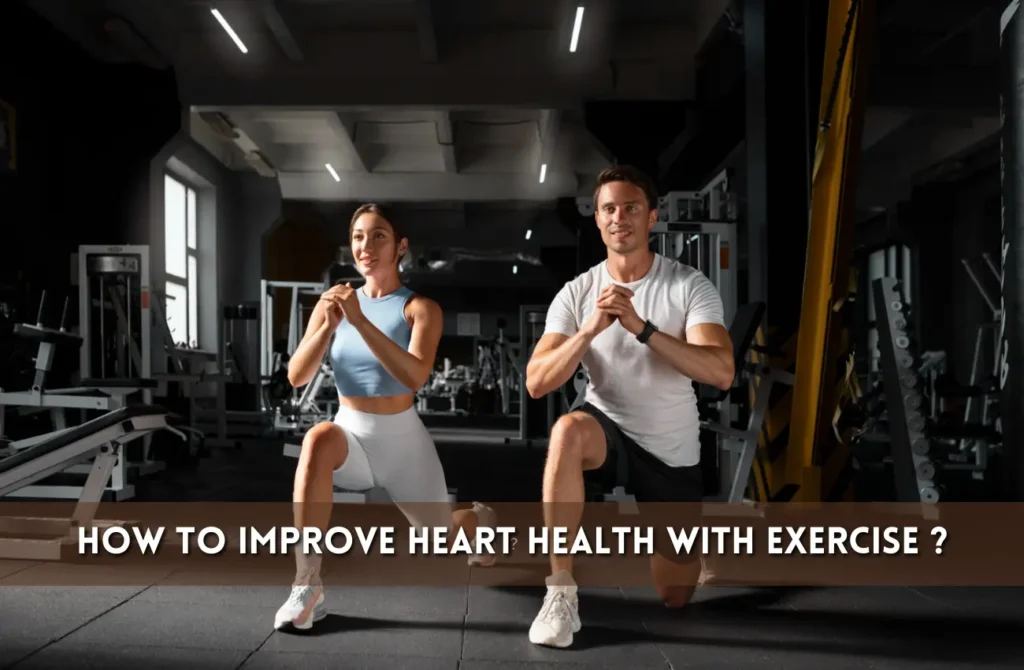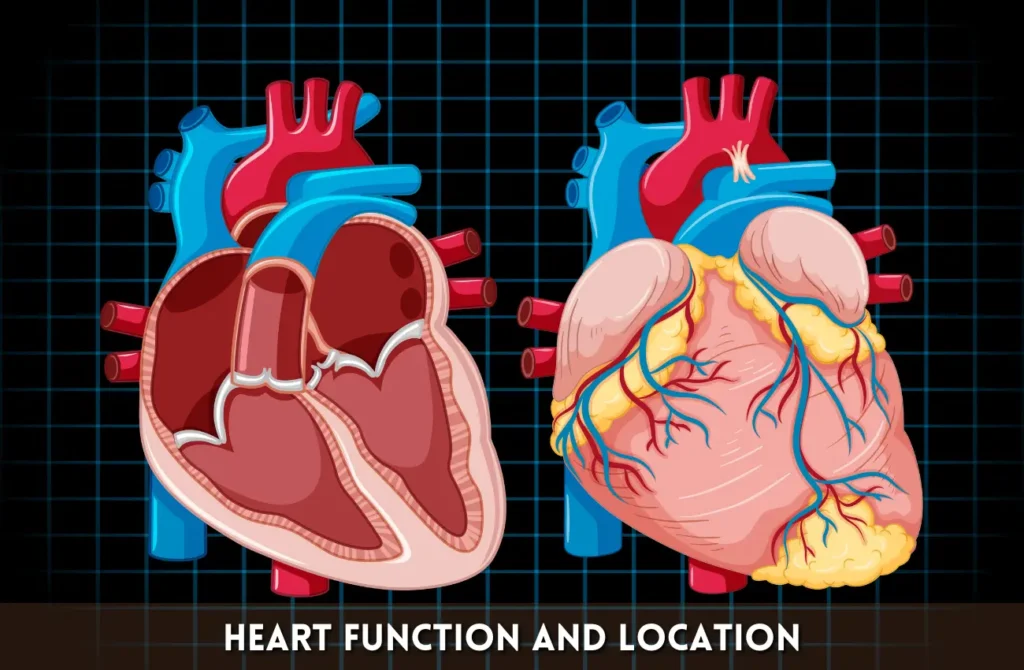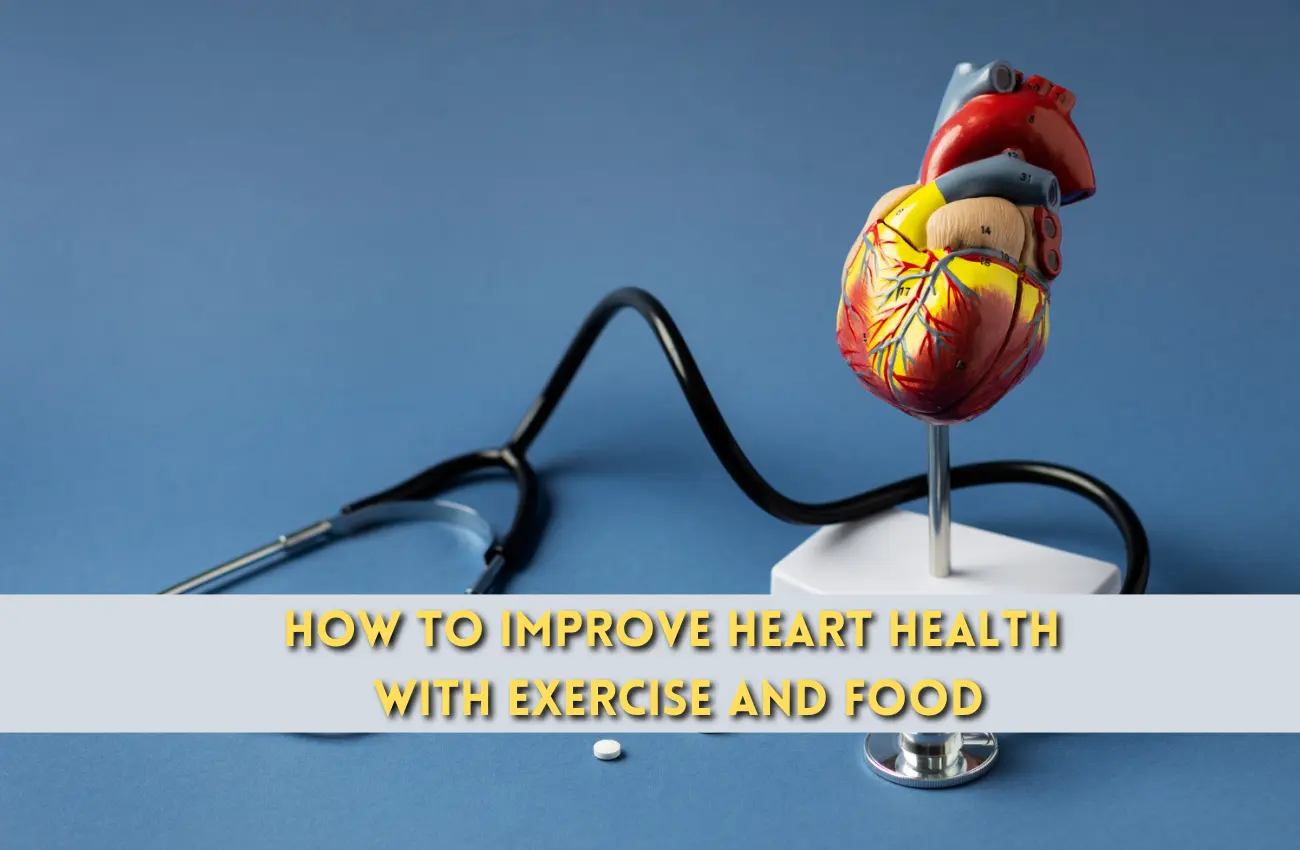Introduction
Did you hear that someone you know has passed away from heart disease? Do you have any idea about how rapidly cardiovascular disease deaths are rising around the world? In this blog post, we will discuss all those points which help us improve our cardiovascular health. Learn more about how to improve heart health with exercise and food.
Table of Contents
ToggleHow to Improve Heart Health with Exercise?

Your cardiovascular health is an important factor in your health, as you know a healthy heart is the key to all happiness. Here are some exercises which will help you to improve your heart health.
Brisk Walking: Brisk Walking is a great cardiovascular workout. Try to aim for at least 30 minutes of brisk walking per day to improve cardiovascular health.
Swimming: Swimming is a low-impact exercise that’s easy on the joints and can be adapted to suit different fitness levels.
Cycling: Cycling is another low-impact exercise that can be done indoors or outdoors and is great for improving cardiovascular fitness.
High-Intensity Interval Training (HIIT): High-Intensity Interval Training (HIIT) has emerged as a highly effective exercise approach for improving cardiovascular health. This workout regimen involves alternating short bursts of intense physical activity with brief periods of rest or recovery. By incorporating HIIT workouts into your exercise routine, you can effectively improve your heart health and reduce your risk of cardiovascular disease. Do not forget to seek medical advice before to beginning any new fitness regimen.
Exercise Helps Us In
Lower Blood Pressure: Regular exercise can help to reduce blood pressure levels, which is a significant risk factor for heart disease.
Improve Cardiovascular Function: Exercise strengthens the heart and improves blood flow, reducing the risk of heart failure and other cardiovascular conditions.
Boost Endorphins: Exercise releases endorphins, which can help to reduce stress and anxiety, both of which are known to negatively impact heart health.
Food for a Healthy Heart

A balanced diet rich in essential nutrients is also crucial for maintaining heart health. Here are some key foods to include in your diet. A well-balanced diet helps you not only in your cardiovascular health but also this diet effective for fat loss:
Fatty Fish: Fatty fish like salmon, tuna, and mackerel are rich in omega-3 fatty acids, which help to reduce inflammation and improve cardiovascular health.
Leafy Greens: Leafy greens like spinach, kale, and collard greens are rich in vitamins and minerals that help to support heart health.
Berries: Berries like blueberries, strawberries, and raspberries are rich in antioxidants and fiber, which can help to reduce inflammation and improve cardiovascular health.
Nuts and Seeds: Nuts and seeds like almonds, walnuts, and chia seeds are rich in healthy fats and fiber, which can help to support heart health.
Recommended Dietary Advice for Cardiovascular Health
Limit Saturated Fats: Limit your intake of saturated fats, which can increase cholesterol levels and contribute to heart disease.
Choose Whole Grains: Choose whole grains like brown rice, quinoa, and whole-wheat bread instead of refined grains to reduce your risk of heart disease.
Watch Your Sodium Intake: Limit your sodium intake to reduce blood pressure and the risk of heart disease.
Stay Hydrated: Drink plenty of water throughout the day to help maintain blood pressure and overall cardiovascular health.
Information About Heart Function and Location.

The heart is a remarkable and hardworking organ, located in the chest behind and slightly to the left of the breastbone. This powerful muscle is the central component of the cardiovascular system, constantly pumping blood through a network of blood vessels, including arteries, veins, and capillaries.
The Heart's Primary Functions in Human Body
Pumping Oxygenated Blood: The heart’s primary role is to pump oxygen-rich blood to the various tissues and organs throughout the body, ensuring they receive the necessary oxygen and nutrients.
Hormone and Substance Delivery: In addition to blood, the heart also pumps out hormones and other essential substances, distributing them to different parts of the body via the circulatory system.
Receiving and Oxygenating Blood: The heart receives oxygen-poor blood from the body and pumps it to the lungs, where it is oxygenated. The heart then receives the oxygenated blood and pumps it back out to the body, transporting metabolic waste products in the process.
Blood Pressure Regulation: The heart plays a crucial role in maintaining healthy blood pressure levels, as its rhythmic contractions and relaxations help to circulate blood throughout the body.
The right atrium and right ventricle make up the “right heart,” while the left atrium and left ventricle form the “left heart.” This intricate and well-coordinated system works tirelessly to ensure the efficient delivery of oxygen and nutrients to every cell in the body, while also removing waste products and maintaining optimal blood pressure.
Cardiovascular Mortality Worldwide
Cardiovascular diseases (CVDs) are a major global health concern, with China reporting the highest number of CVD deaths worldwide, followed by India, Russia, the United States, and Indonesia. But when compared to 1990, age-standardized death rates for all CVD were much reduced in France, Peru, and Japan at the national level; in 2019, rates were six times lower.
Conclusion
When is come to how to improve heart health with exercise, keep in mind that Improving your heart health requires a comprehensive approach that combines regular exercise and a balanced, nutrient-rich diet. By incorporating the exercises and foods outlined in this guide into your daily routine, you can significantly reduce your risk of heart disease and maintain a healthy cardiovascular system. Remember to always consult with a healthcare professional before starting any new exercise or dietary program.

